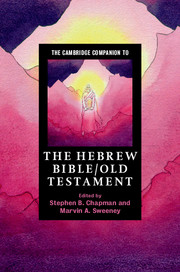Book contents
- Frontmatter
- Contents
- List of Tables, Maps, and Figures
- List of Contributors
- List of Abbreviations
- Introduction
- Part I Text and canon
- Part II Historical background
- 3 The ancient Near Eastern context
- 4 The history of Israelite religion
- 5 The Hebrew Bible and history
- Part III Methods and approaches
- Part IV Subcollections and genres
- Part V Reception and use
- Index
- Cambridge Companions to Religion (continued from page iii)
- References
5 - The Hebrew Bible and history
from Part II - Historical background
Published online by Cambridge University Press: 05 July 2016
- Frontmatter
- Contents
- List of Tables, Maps, and Figures
- List of Contributors
- List of Abbreviations
- Introduction
- Part I Text and canon
- Part II Historical background
- 3 The ancient Near Eastern context
- 4 The history of Israelite religion
- 5 The Hebrew Bible and history
- Part III Methods and approaches
- Part IV Subcollections and genres
- Part V Reception and use
- Index
- Cambridge Companions to Religion (continued from page iii)
- References
Summary
In modern parlance, the term “history” is used in two main senses: the past and (written) depictions of the past, often called “historiography.” These two senses live in an uncomfortable tension because the past is a set of events that transpired once and can never be recaptured exactly. Instead, various efforts can be made to capture these events in some form – most often through a writing system that can tell certain aspects of what really happened. Societies desire to recapture the past at particular points in time for particular reasons.
The introductions to the two great Greek histories that are often thought of as the beginning of history in the fifth century BCE, The Histories by Herodotus and The History of the Peloponnesian War by Thucydides, offer explicit reasons for trying to recapture the past. Herodotus opens his work
Herodotus of Halicarnasssus, his Researches [Greek: historiai] are here set down to preserve the memory of the past by putting on record the astonishing achievements both of our own and of other peoples; and more particularly, to show how they came into conflict.
Thucydides opens
Thucydides the Athenian wrote the history of the war fought between Athens and Sparta, beginning the account at the very outbreak of the war, in the belief that it was going to be a great war and more worth writing about than any of those which had taken place in the past…. This was the greatest disturbance in the history of the Hellenes…. For though I have found it impossible, because of its remoteness in time, to acquire a really precise knowledge of the distant past or even of the history preceding our own period, yet, after looking back into it as far as I can, all the evidence leads me to conclude that these periods were not great periods either in warfare or in anything else.
No comparable introduction is found in any text from the ancient Near Eastern world. In contrast to these two works, ancient Near Eastern accounts are typically anonymous, do not have introductions, and do not offer explicit reasons why they have been written.
This may suggest that it is best to avoid the term “history” for the Bible and, perhaps, the pre-Hellenistic ancient world. Many surveys of history writing do in fact exclude the Bible, beginning with the classical world.
- Type
- Chapter
- Information
- The Cambridge Companion to the Hebrew Bible/Old Testament , pp. 108 - 126Publisher: Cambridge University PressPrint publication year: 2016



